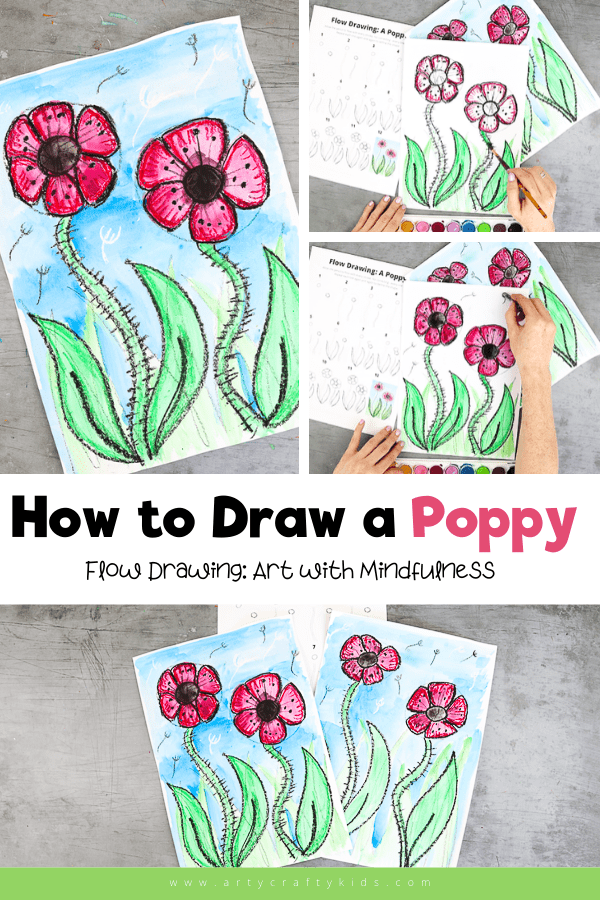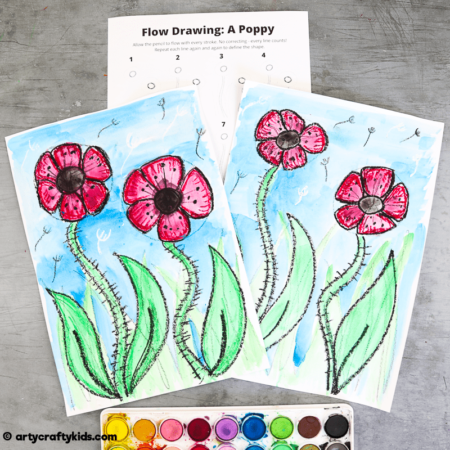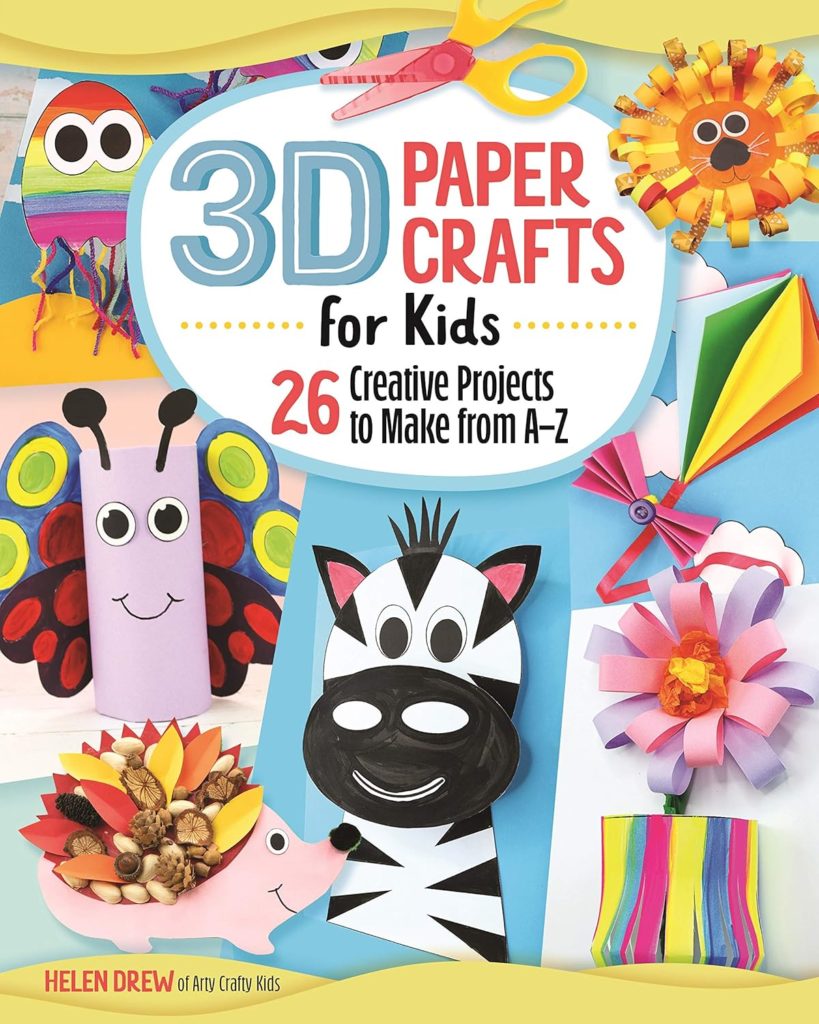Sharing is caring!
Flow Drawing for Kids: How to Draw a Poppy – If you’ve been following our flow drawing posts, you’ll know that we’ve focused on animals so far. But you guys have been loving our new technique so much that we thought it was time to bring you something a little bit different!
And what better place to start than the poppy! It almost has its own personality, growing wild and free in the fields and hedgerows. The bold red spring flower has also come to symbolise courage, strength and remembrance in many countries, so it really deserves to be the centre of some special artwork.
If you’re in the US and have been celebrating Memorial Day, this would make the perfect addition to a display, and if you’re in the UK: don’t forget to bookmark this post for Remembrance Day in November! But of course, it would also make a beautiful spring-themed standalone piece at any time of year.
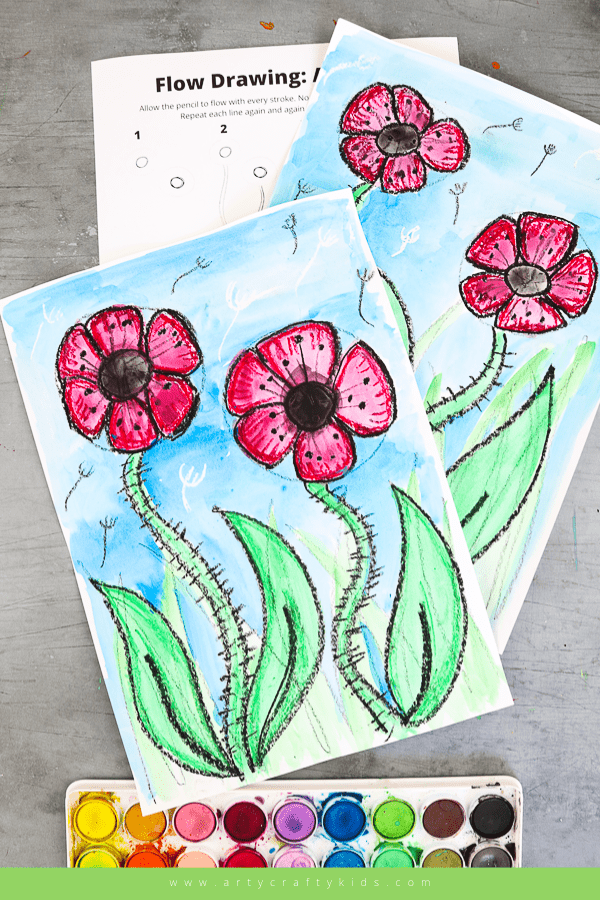
What is Flow Drawing?
Flow Drawing is a new art technique developed by us to encourage children (and adult beginners too!) to understand shapes and create illustrations, in a much ‘freer’ way. By removing restrictions, flow drawing encourages children to fully engage in the moment and discover their natural flow, making every line count and bringing mindfulness to their creative process.
You can think of the flow drawing technique as a ‘how to draw’ guide with a difference – children won’t just draw a picture, they’ll create a unique work of art, right from their soul.
Flow Drawing Benefits:
Although the process of flowing more naturally in art might seem a little alien to children at first, it’s really worth encouraging them to have a go. Flow drawing has so many benefits and helps little hands and minds to:
- Explore simple shapes and how they work together to create larger forms
- Discover their natural flow and rhythm through repetitive movements
- Learn how to combine mediums, with a fun and easy approach
- Build confidence in their own creative ability
- Combat ‘perfection-seeking’ in art, providing a much needed alternative to rigid ‘how to draw’ guides
- Bring mindfulness to the creative process and boost mental health
- Foster a love of art and self-expression.
Flow Drawing for Kids: How to Draw a Poppy
What you need:
White Card Stock
Oil Pastels or Wax Crayons
Watercolor Paints
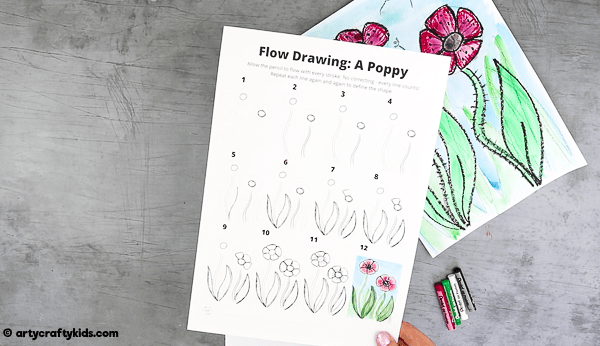
Download the How to Draw a Poppy Guide:
The How to Draw a Poppy guide is available to members of the Arty Crafty Kids club. Members will need to log in to access the template: https://www.artycraftykids.com/product/flow-drawing-how-to-draw-a-poppy/
Not A Member?
Let’s Draw a Poppy!
Watch the Video:
Step by Step Tutorial:
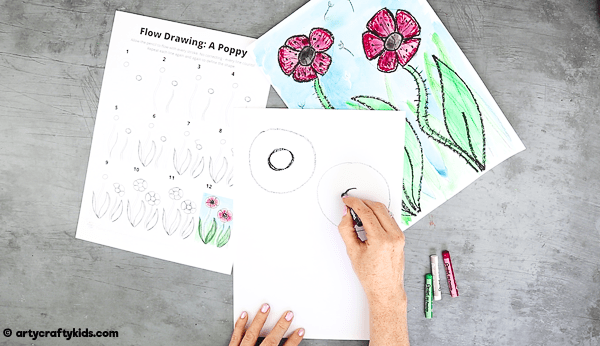
Start with Circles
As well as exploring natural flow, this guide will teach children how to utilise light and dark lines, helping them to understand pressure and technique.
Start by drawing one large circle – we’re going to draw this one lightly. Then draw a smaller circle inside the larger one – we’re going to be press down more firmly this time to create a darker, heavier shape.
Draw both circles a second time if you want two poppies on the page like us.
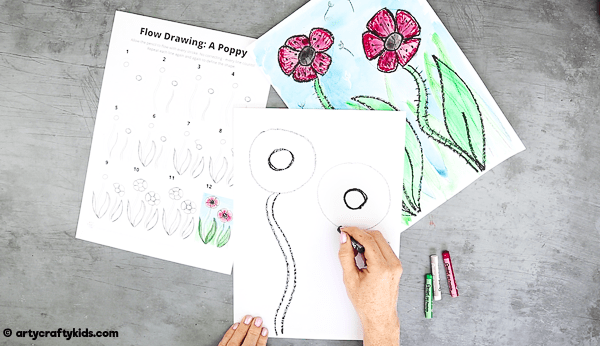
Draw the Stems
For the stems, draw two free flowing wriggly lines down from the large circles. Don’t think about them too much, just draw – remember, this is flow drawing and poppies are wildflowers!
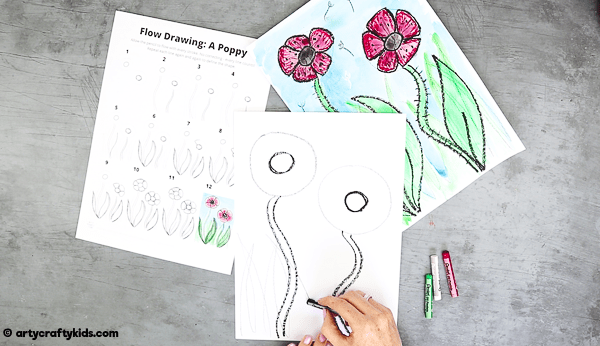
Draw Spiky grass
Now for some grass in the field of wildflowers! Let yourself go and draw the grass with quick movements, up and down, making erratic zig-zags that move from one side of the page to the other.
But we don’t want to scribble dark lines across our pretty flowers – make sure you draw the grass lightly by pressing gently with your crayon.
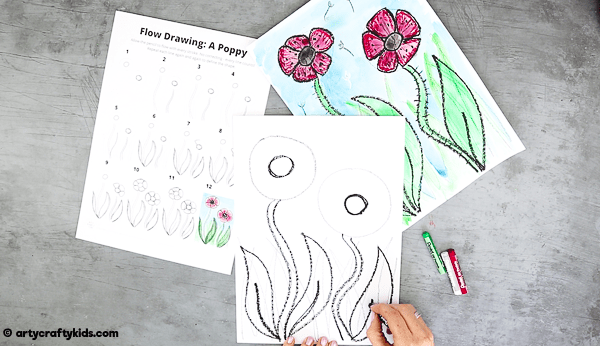
Add Poppy Leaves
Let’s add some leaves. With a firmer pressure, draw over the grass to create bold, darker leaves. Swoop out and up from the bottom of the stem to a point; then down, out and in again to meet the leaf at the bottom. Repeat on the other side of the stem. Don’t forget to let those leaf shapes flow naturally!
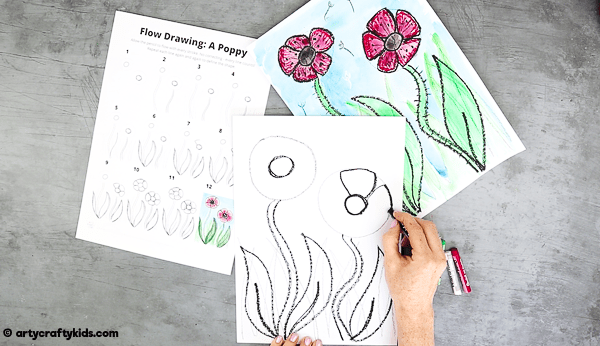
Creating the Petals
Using the light, larger circle as a guide, use more pressure this time to create defined poppy petals on your flower.
Starting at the inner circle, draw a diagonal line up to the outer circle, trace around some of the edge, and then draw another diagonal back to the inner circle again.
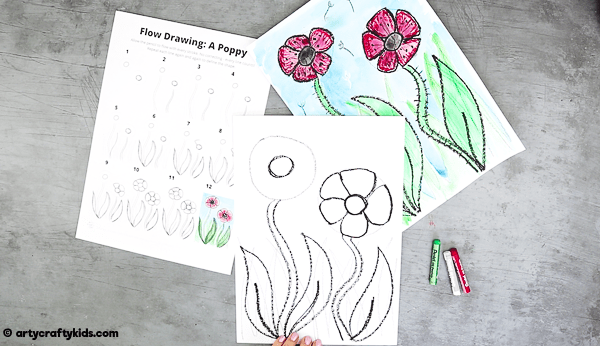
Fill the Circle
Repeat this process three or four more times around the circle to create all of the petals.
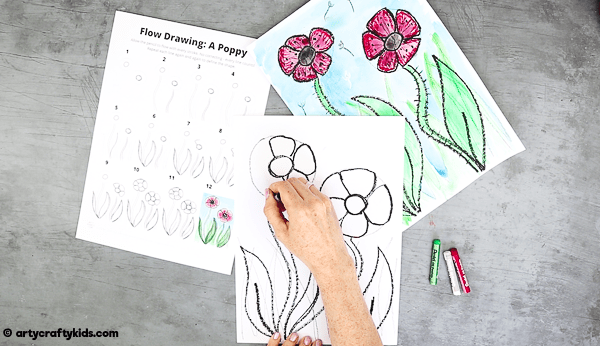
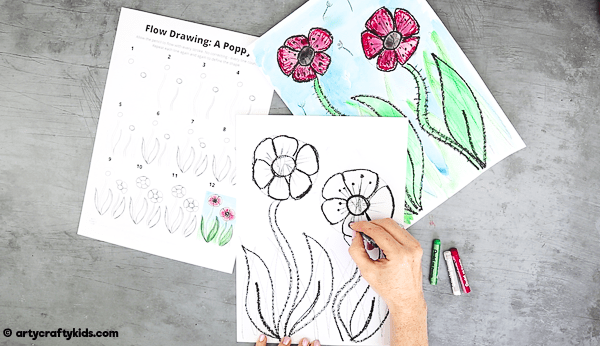
Add Detail
Poppies have lots of very recognisable stamens (the bits that stick out and make the pollen), so add these onto your poppy by drawing sticks with dots on the end all around the middle circle.
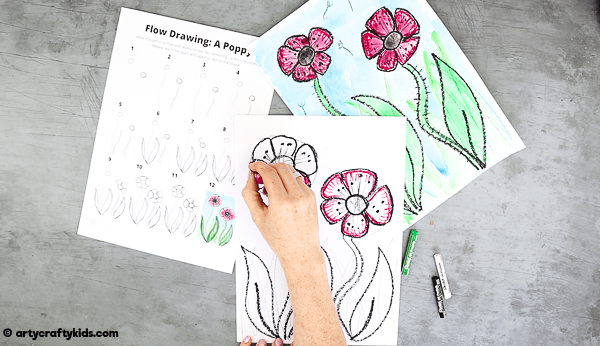
Time to Play
Now for the fun part! We know poppies are red, but let’s explore and play with the color a bit more. Just like we did with the crayon to make light and dark lines, experiment with your oil pastel, using different pressure and techniques, to give your petals depth and texture.
Why not try using it around the outside of the petals to emphasise their edges?
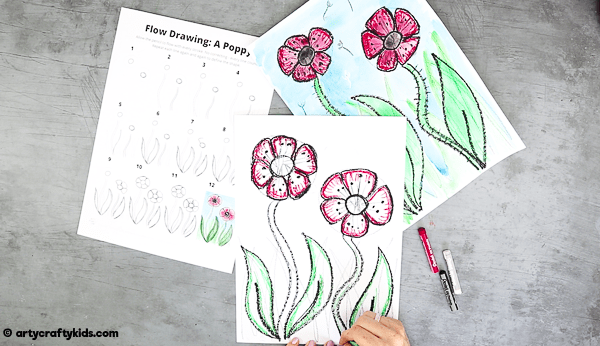
Then move onto contrasting green for the leaves and stems – move your pastels around the edges, create patterns or veins in the leaves – it’s up to you!
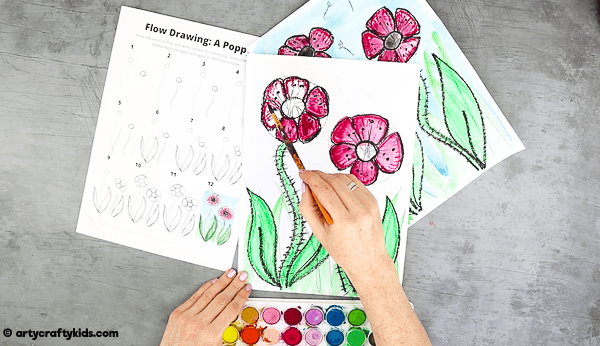
Let’s Add Color
We’ve designed a beautiful base, so let’s start painting!
Use different shades of green to differentiate the grass, leaves and stem and to highlight the patterns you’ve created.
Then play with the red – notice how the oil pastel contrasts with the paint and adds emphasis to the areas you’ve used it.
Such an easy technique, but it really captures the texture and personality of the poppy!
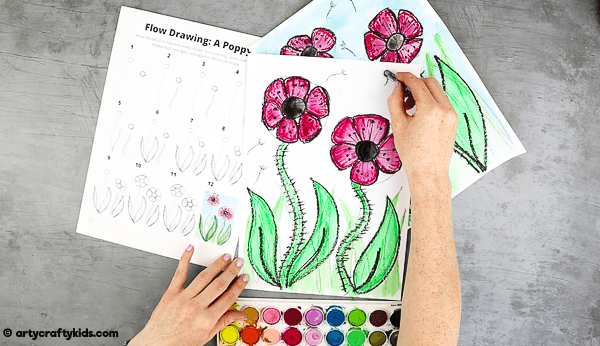
Dandelion Clocks
Let’s complete our artwork with a pretty background. Using black and white oil pastel, draw some short lines with spiky tops around the flowers, to create the impression of dandelion clocks blowing in the wind through a spring meadow.
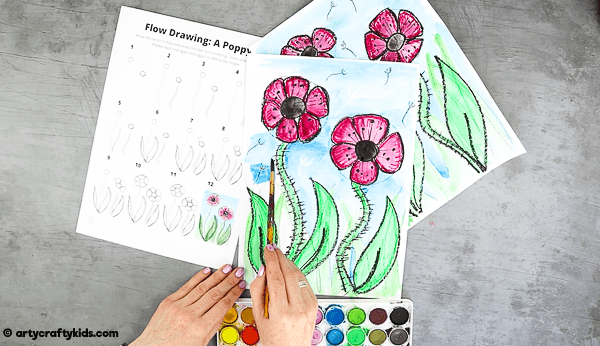
Using your watercolors once more, paint in a bright blue sky to complete your artwork. Doesn’t it look so fresh and peaceful? I can almost imagine lying down for a nap in this field of beautiful wildflowers…
We know there might be a lot to take in with this one, so let’s have a quick recap. As well as all the flow drawing benefits, our poppy guide will help children to:
- Understand light and shade within art, how to create it, and why it might be necessary
- Explore color and how to use it to create depth, texture and shade
- Experiment with different mediums and help them to understand how they can work together to create maximum effect.
We really hope you love our new poppy flow drawing guide and, as always, don’t forget to share and tag us on social media!
More Flow Drawing ‘How to Draw Guides for Kids’:
How to Draw a Llama:
https://www.artycraftykids.com/art/flow-drawing-for-kids-how-to-draw-a-llama/
How to Draw a Cat:
https://www.artycraftykids.com/art/flow-drawing-for-kids-how-to-draw-a-cat/
How to Draw a Little Bird:
https://www.artycraftykids.com/art/flow-drawing-for-kids-how-to-draw-a-little-bird/
